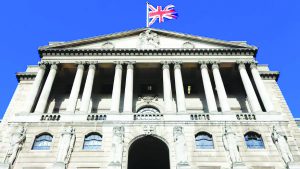BLOOMBERGÂ
Bank of England (BOE) policy maker Swati Dhingra cautioned against raising interest rates further, saying that doing so could damage an already weak UK economy.
The newest official on the central bank’s nine-member Monetary Policy Committee (MPC) said it would be prudent to hold borrowing costs steady for now and noted there’s little evidence of an inflationary spiral.
“Overtightening poses a more material risk at this point, through potential negative impacts from increased borrowing costs and reduced supply capacity going forwards,†Dhingra said in remarks prepared for an event at the Resolution Foundation in London. “It risks unnecessarily denting output at a time when the economy is weak and deepening the pain for households when budgets are already squeezed through energy and housing costs.â€
The speech intensifies the debate at the BOE over whether to pivot towards a pause in rate rises. Traders have ramped up their bets on more BOE hikes in recent days despite attempts to temper expectations from some of the MPC. Markets are now leaning towards a further 100 basis points of hikes in the UK, pushing the BOE’s key lending rate to 5%. That followed hawkish comments from the US Federal Reserve and European Central Bank (ECB).
Dhingra’s view contrasts sharply with those of fellow BOE policy maker Catherine Mann and confirms her as one of the most dovish officials at the BOE. However, the speech didn’t suggest she’s considering when it would be appropriate to cut rates as her colleague Silvana Tenreyro has indicated.
Dhingra pointed to a raft of factors that suggest that price pressures are rapidly easing and that further rate rises would amplify the economic damage.
“In my view, a prudent strategy would hold policy steady amidst growing signs external price pressures are easing, and be prepared to respond to developments in price evolution,†Dhingra said. “Given little evidence of further cost-push inflation, further tightening is a bigger risk to output and the medium-term inflation target.â€
Dhingra said previous hikes have yet to “fully take hold†and pointed to evidence that suggests firms are struggling to fully pass on higher costs. Inflation expectations are cooling and surveys point to wage growth “flattening off,†she added.
She calculated that 7.1 percentage points of the inflation rate is due to a jump in energy costs and other imports, while 2.9 points is from domestically generated inflation, including wages and profits. The UK’s inflation rate has fallen from a peak of 11.1% in October to 10.1% currently.
 The Gulf Time Newspaper One of the finest business newspapers in the UAE brought to you by our professional writers and editors.
The Gulf Time Newspaper One of the finest business newspapers in the UAE brought to you by our professional writers and editors.
